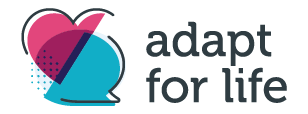You are not alone.
If you or your student participate in the Adapt for Life program or you are using the ADAPT Framework to better cope with stress, these are the key items we want everyone to learn:
AWARENESS
You are NOT alone! There are people who can and want to help!
Acknowledge ambiguity: It isn’t always easy to know what people are really feeling, including ourselves.
Activate awareness: Helping yourself and others begins by paying attention.
DESCRIBE
We’re all affected by stress differently. We engage in different behaviors when stressed.
Describe triggers, cues, and behaviors. Describing your triggers, cues, and the behaviors we see in others and/or in ourselves, helps us define what is causing stress.
To have a healthy result, apply adaptive strategies. Adaptive strategies help you manage and cope.
ASSESS
Assess behaviors: Assessing behavioral change helps us identify warning signs that indicate that we or someone else needs help.
Warning signs: Certain behaviors can be warning signs. Assessing behavioral change and the severity of the change help us understand the level of risk.
Overcome obstacles: It may seem easier to ignore concerns and/or avoid getting involved; obstacles are normal, expected, and can be overcome.
PLAN
Desired outcomes: Planning for desired outcomes helps us identify adaptive strategies to reduce stress.
Prepare for action: Planning for how you will help yourself and/or others means being prepared to take action.
Voice concerns: Planning how to voice concerns for yourself and/or others will make it easier to take action when it matters most.
TALK, TACKLE, AND THRIVE
Talk: Talking to a trusted adult during everyday moments and times of crisis is an important part of helping yourself and/or someone else.
Tackle: Learning and having the ability to adapt is key to tackling stress.
Thrive: Practicing gratitude can focus our attention so we can thrive.
